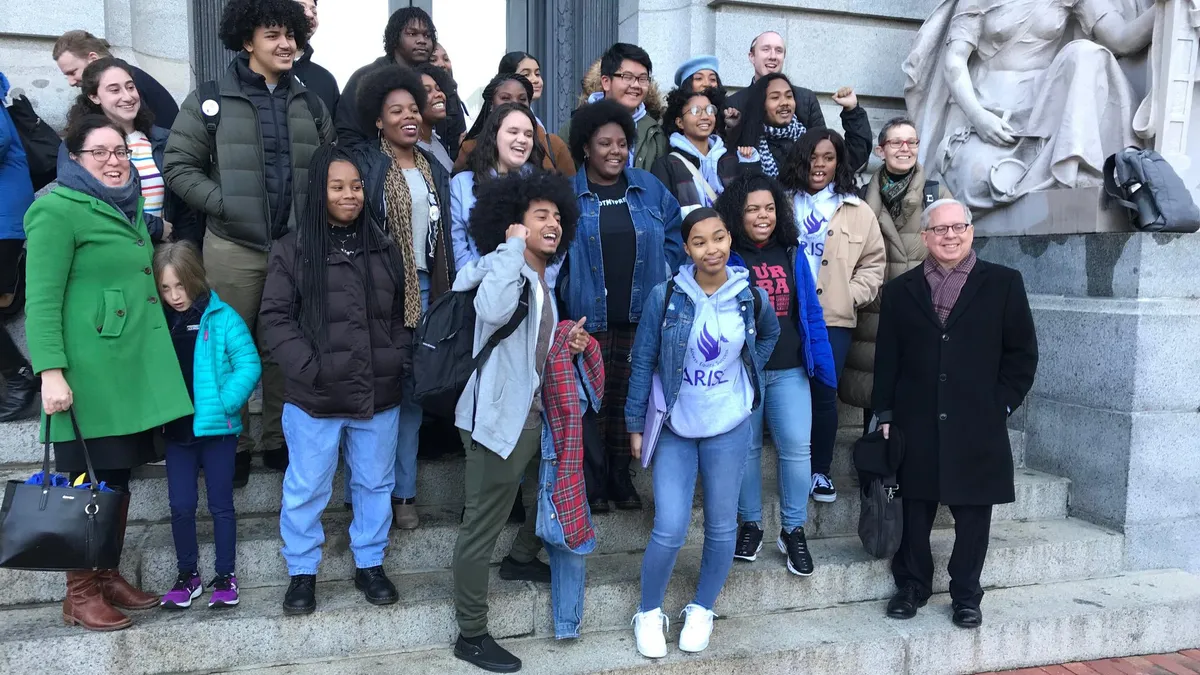About 50 students attended a hearing at the U.S. District Court in Providence, Rhode Island, Thursday where they were about to learn things they say they haven’t been taught in school.
“Being in that courtroom pushed my desire to pursue the path of being a lawyer and understand the vernacular that these people are using because right now I don’t, because I don’t have civics education,” 16-year-old Jayson Rodriguez said during a briefing following the hearing where attorneys on both sides of the Cook v. Raimondo right-to-education case presented oral arguments before Judge Chief Judge William E. Smith.
The plaintiffs — including current, former and future Rhode Island students — say the state is not providing an education that adequately prepares students to participate as informed citizens in civic life. While some districts provide civics education, others don’t.
“I guess my knowledge of civics education is obviously very limited,” said lead plaintiff Aleita Cook, adding what she has learned about politics has been acquired outside of school. Now 18, she said she was excited about being old enough to vote.
Attorneys for Gov. Gina Raimondo, the state legislature, state Education Commissioner Ken Wagner and the state Board of Education, however, argue the case should be dismissed because the U.S. Constitution does not specifically grant the right to an education.
Michael Rebell, lead counsel for the plaintiffs and founder of the Educational Equity Campaign at Teachers College, Columbia University, described the hearing as a lively dialogue in which Smith raised a variety of questions and concerns.
“It was what we call in the trade ‘a hot bench.’” Rebell said. “This is the ideal of what a really productive oral argument before a judge should be.”
Smith, Rebell said, brought up the topic of media literacy as an element of civics.
In response to the judge asking exactly what the plaintiffs want, Rebell said he made the point that unlike desegregation and past school finance cases, the court would not have to provide ongoing monitoring to ensure compliance.
“We want the court to declare that all kids have the right to an education that prepares them to vote, to exercise their First Amendment rights,” he said, adding attorneys for the state did agree if the state completely eliminated its education system, then students would have a federal right to complain. “That was a huge concession in my mind.”
As with Gary B. v. Snyder, a Michigan case filed in federal court on behalf of Detroit students against former Gov. Richard Snyder, the plaintiffs in the Cook case say the U.S. Supreme Court left the question of a Constitutional right to education unresolved 46 years ago in San Antonio Independent School District v. Rodriguez. In their ruling on that school funding case, the justices referred to the “basic minimal skills necessary for the enjoyment of the rights of speech and of full participation in the political process.”
In the Michigan case, now before the federal appeals court for the Sixth Circuit, plaintiffs allege the state has failed to provide adequate literacy instruction, particularly for low-income students of color.
In Rhode Island, regardless of how Smith rules, the decision will likely be appealed to the First Circuit appellate court. Rebell responded to a question regarding the state's assertion that the plaintiffs should be suing local school boards, not the state. But Rebell said it's the state that sets policy and decides whether to hold local districts accountable for student performance.
"What we’re dealing with here is a state that downgraded civics education," he said. "This is state policy, state action and often state inaction."
Symone Burrell, another student who attended the hearing, said she didn't understand a lot of what was going on. But she said she did pick up on the state's argument.
"It was concerning to hear them keep stating the point that education was not a right," she said. "It's scary that the people who are running our education feel that way and firmly believe that."
Megan Geoghegan, a spokeswoman for the Rhode Island Department of Education, reiterated the state's position that there is "legal precedent emphasizing local control over the operation of schools." She said the state has regulations and guidance relating to social studies and civics in the curriculum, "but the responsibility for implementing these tools rests at the local level."
She said that "outside of the courtroom" the state is willing to work with partners to improve civics education. And she added, "Although we sat on different sides of the courtroom today, we admire the students involved in this case. They have demonstrated incredible poise, confidence and tenacity in their efforts to advocate for themselves and for their peers."






















